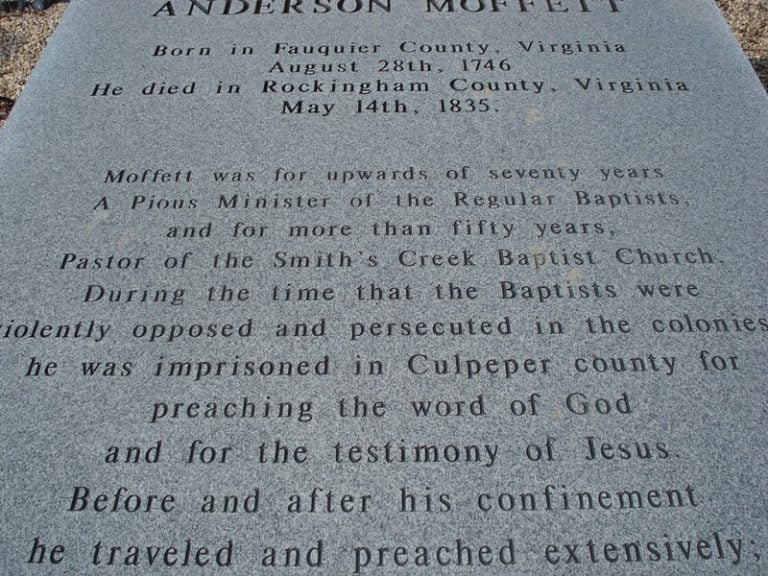“In those days that tried men’s souls the old hero preferred the bread and water diet and the foul air of Culpeper jail, to the abandonment of his faith in Christ and loyalty to him as King.”
Located just west of New Market, Virginia (originally called “Cross Roads”), is the grave of Anderson Moffett, the third pastor of Smith Creek Baptist Church; he pastored there for 50 years. Inscribed on the flat slab marking his final resting place are these updated words:
“In memory of the many virtues of Anderson Moffett, Born in Fauquier County, Virginia Aug 28th 1746. He died in Rockingham County, Virginia May 14th 1835. Moffett was for upward of 70 years a pious minister of the Regular Baptists, and for more than 50 years pastor of the Smith’s Creek Baptist Church. During the time that the Baptists were violently opposed and persecuted in the colonies, he was imprisoned in Culpeper county for preaching the Word of God, and for the testimony of Jesus. Before and after his confinement, he traveled and preached extensively, and the Lord giving testimony to the word of his grace, made him instrumental in turning many from darkness unto light.”
These are “updated words” because recently (2004) the Baptist History Preservation Society did some renovation work on the original grave marker. The original marker read like this:
In
Memory of the many virtues of
Anderson Moffett
Who was for upwards of 70 years
A pious Minister of
the regular Baptist Denomination,
And for more than 50 years
Pastor of
Smiths Creek Church.
Born in Fauquier
Aug’t 28th, 1746
And died in Rockingham County, Va.
May 14th, 1835′.
Elder Moffatt was, as one biographer put it, a “(preacher) of the old school” (Duvall, Baptist History Homepage); he was “a steady, pious and useful minister of the gospel.” (Semple, pg. 100)
“He had an ordinary English education, though greatly improved by extensive reading, deep and profound reflection. He manifested a warm and zealous interest in the cause of the Colonies in their struggle with their mother country, which finally eventuated in establishing their political and religious liberty, and enabled them to take a high and respectable standing among the nations of the earth.” (Religious Herald)
Moffett was considered a “dissenter” because he refused the licensure of the established church in Virginia.
“When the Established Church in the Virginia colony, following the example of the mother country, determined to stamp out, what it pleased to call the heresy of the dissenters, prominent among those, whom neither the whipping in public pillory, the fines of the courts, the imprisonments in the common jails nor the howlings of the maddened mob could intimidate was a representative of the Moffett family.
This imprisonment refers to the time when Moffett with several other Baptist ministers was thrown into jail because they would not cease preaching the word of God and the gospel of Jesus Christ to the people. Elder Anderson Moffett was a true patriot, a faithful preacher and an earnest and consecrated christian gentleman.” (Duvall, Baptist History Homepage)
The imprisonment took place at the Culpeper Jail, which was most likely part of the same courthouse complex designed by a 17-year-old surveyor named George Washington.
“One of Washington’s first duties as county surveyor was to lay out the County’s courthouse complex, which included the courthouse, jail, stocks, gallows and accessory buildings. By 1752, the complex stood at what is now the northeast corner of Main and Davis Streets.” (www.culpeperva.org)
Image Credit: Home. www.smithcreekbaptistchurch.com/History.html.
Related
Sorry, no records were found. Please adjust your search criteria and try again.
Sorry, unable to load the Maps API.
